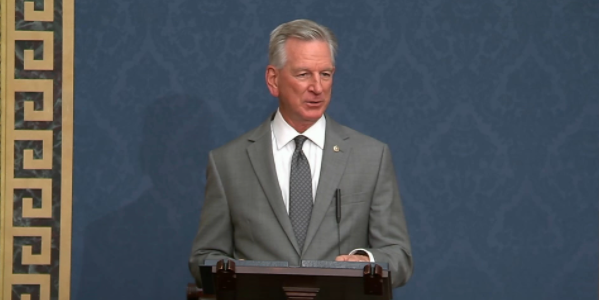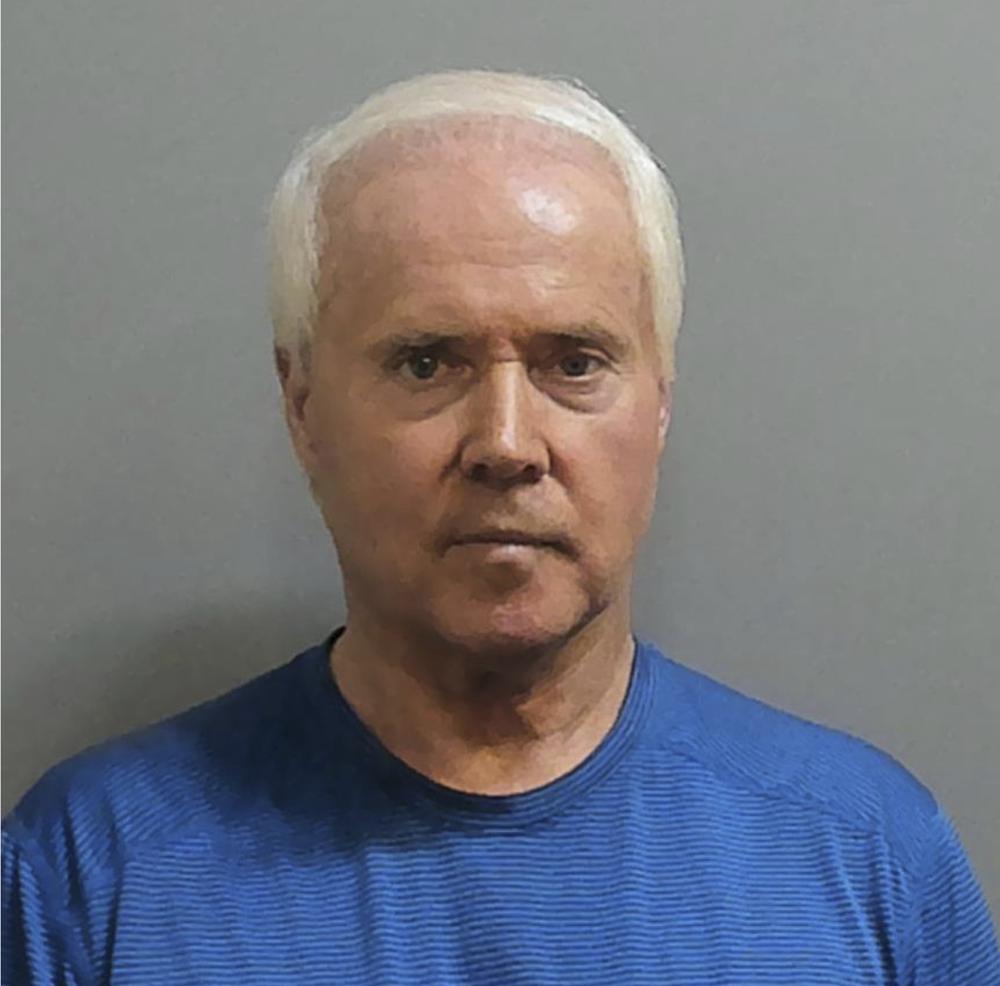Ronna McDaniel re-elected to fourth term as Chair of RNC

On Friday, the Republican National Committee (RNC) met and voted to give incumbent Ronna Romney McDaniel an unprecedented fourth term as Chair of the RNC. McDaniel fought off fierce challenges from California Lawyer Harmeet Dhillon and My Pillow founder and President Mike Lindell. It was a landslide victory for McDaniel, who won 111 of the votes, Dhillon won 51 votes, and Lindell just 4. “With us united, the Democrats are going to hear us in 2024,” McDaniel said after thanking Dhillon and Lindell for the races that they ran. Florida Governor Ron DeSantis had openly backed Dhillon, saying on Thursday, “I think we need to get some new blood in the RNC.” “We’ve had three sub-standard election cycles in a row—’18, ’20, and ’22—and I would say of all three of those, ’22 was probably the worst given the political environment of a very unpopular President [Joe] Biden,” DeSantis said. “Huge majorities of the people think the country is going in the wrong direction.” The Alabama Republican Steering Committee had made national headlines by voting “no confidence” in McDaniel earlier this month. “The Alabama Republican Party’s Steering Committee cannot support or endorse Ronna McDaniel for RNC Chair and declare our vote of no-confidence in her leadership,” the Steering Committee said in a statement. “We encourage all RNC members across the country to support new leadership at the RNC Winter Meeting.” Alabama had three votes: ALGOP Chairman John Wahl, National Committeeman Paul Reynolds, and National Committeewoman Barbara Drummond. It is not known how the Alabama delegates voted as this was a secret ballot. Most Republican heavyweights, including former President Donald Trump, Speaker of the House Kevin McCarthy, and former Vice President Mike Pence, had steered clear of the RNC battle. More than 150 Republican donors endorsed McDaniel in the RNC leadership race. U.S. Sen. Rick Scott endorsed McDaniel. Sen. Scott said, “[McDaniel] has played a major role in helping turn Florida red and fighting for conservative values across the country. Thank you, Ronna, for all you’ve done to help elect strong Republicans in the Sunshine state!” McDaniel defended her record as RNC chair and said that it is not her fault that the GOP has not performed better in elections during her tenure. “I’m not the coach. I don’t pick the players. The voters do. I don’t call the plays. The candidates pick their own plays,” she told Semafor in an interview published earlier this month. “I mean, we defied history in 2018, picking up three Senate seats in a midterm year. We picked up 15 seats in 2020 in the House, which was unprecedented, and then this year, winning back the House,” she also noted at the time. Dhillon made national headlines when she accused some Alabama Republicans of waging a whisper campaign about her non-Christian religious beliefs (she is an immigrant from India and a member of the Sikh faith). This election will make McDaniel the longest-serving Chair in the history of the Republican Party. To connect with the author of this story or to comment, email brandonmreporter@gmail.com.
Tommy Tuberville supports expanding school choice opportunities during National School Choice Week

As National School Choice Week comes to a close, U.S. Senator Tommy Tuberville joined U.S. Senator Bill Cassidy and U.S. Representative Adrian Smith to introduce the Educational Choice for Children Act to expand educational opportunities for students by providing a donation incentive for individuals and businesses who fund scholarships for public and private K-12 education expenses. “There is no better cause than creating educational opportunities for our next generation of leaders,” Tuberville said in a press release. “Incentivizing greater investment in school choice will empower parents and students to make the decision best for them. I’m proud to support this legislation to ensure our students can achieve the brightest future possible.” “Parents deserve the right to make the best educational decision for their child, regardless of income,” said Sen. Cassidy. “Our bill empowers families to pick the school that best fits their children’s needs.” U.S. Senator Katie Britt also signed on as a co-sponsor of the legislation. “This National School Choice Week, let’s recommit to ensuring that every single child across Alabama and our nation has the opportunity to unlock the American Dream through a high-quality education,” said Sen. Britt earlier this week in support of expanded school choice. “No child’s zip code should determine their destiny. School choice empowers families with the freedom to make important decisions to help their children achieve their full potential and secure a bright future.” The Educational Choice for Children Act would: · Provide $10 billion in annual tax credits to be made available to taxpayers. Allotment of these credits to individuals would be administered by the Treasury Department. · Use a limited government approach with respect to federalism, thus avoiding mandates on states, localities, and school districts. · Include provisions that govern Scholarship Granting Organizations (SGOs), as SGOs are given the ability to determine the individual amount of scholarship awards. Numerous school choice advocacy groups endorsed the legislation, including the Invest in Education Coalition, American Federation for Children, U.S. Conference of Catholic Bishops, Heritage Action, Home School Legal Defense Association, Agudath Israel, Orthodox Union, Association of Christian Schools International, CAPE, Excel in Education, and former U.S. Secretary of Education Betsy DeVos. According to the Invest in Education Coalition, 49 million American children are currently in public schools. Only three percent of those children have a choice program in place so they can opt out of state-controlled education. Tuberville spent over forty years in education as a coach and teacher. Tuberville has been an outspoken advocate for expanding school choice opportunities. He is serving his first term as a U.S. Senator after unseating incumbent Doug Jones in the 2020 general election. To connect with the author of this story, or to comment, email brandonmreporter@gmail.com.
Kay Ivey announces more money for broadband coming to Alabama

The federal government is sending Alabama more money to extend broadband access to more people in the state. Alabama Governor Kay Ivey announced on Thursday that the U.S. Treasury Department has approved the state’s plan for the Capital Projects Fund, making $191.8 million available for broadband expansion. “Access to broadband is a necessity in today’s world, and I continue to make it a priority that our state has the full ability to be connected to high-speed internet,” said Gov. Ivey. “I often say that broadband expansion is a journey, not a short trip. These funds will enable us to take several more strides in that journey toward full access no matter where you live in Alabama.” The Alabama Department of Economic and Community Affairs will administer the funds as part of a grant program to support projects to extend service to previously unserved areas of the state. “Under Governor Ivey’s leadership and with a strong team effort among the Legislature, internet service providers, and many others, the state has made progress in expanding access to high-speed internet,” said ADECA Director Kenneth Boswell. “While the need is still great, these funds will enable us to make further progress in closing the digital divide in Alabama.” The funds are part of the American Rescue Plan Act (ARPA). Last year the Alabama Legislature approved these dollars for broadband expansion. ADECA was then tasked with creating a plan outlining use of the funds and submitted it to the U.S. Treasury Department in September 2022. The Treasury announced approval of that plan on Thursday. ADECA’s Alabama Digital Expansion Division will roll out the competitive grant program in the coming months. The program will be modeled after the Alabama Broadband Accessibility Fund, which ADECA has administered since 2018. The grants will be available for internet service providers to make “last-mile” connections to previously unserved homes, businesses, and community institutions. Once connected, residents will have the ability to become a customer of the broadband providers. The broadband is not free, and residents don’t have to actually subscribe to the service. Grant projects approved must provide connections of at least 100 megabits per second download/100 megabits per second upload. The governor has made increasing access to broadband a top priority of her administration. She promised in her inaugural address to make Alabama a national model when it comes to broadband expansion. Since 2018, Ivey has awarded $63.9 million in state funds to support 100 projects through the Alabama Broadband Accessibility Fund. Once all those projects are completed, access to broadband will be available to approximately 61,000 more households, businesses and community institutions that currently have no option to subscribe. To connect with the author of this story, or to comment, email brandonmreporter@gmail.com.
Mike Rogers concerned Russia may have violated START treaty

Congressman Mike Rogers released a letter raising concerns that Russia may be in violation of the new START Treaty. Rogers is the Chairman of the powerful House Armed Services Committee. The letter was made jointly with Rep. Michael McCaul, Chairman of the House Foreign Affairs Committee, and Rep. Mike Turner, the Chairman of the House Permanent Select Committee on Intelligence. The three chairmen addressed the letter to Secretary of State Antony Blinken, Secretary of Defense Lloyd Austin, and Director of National Intelligence Avril Haines. They expressed their concerns that Russia has failed to uphold key tenets of the New START Treaty. “Russia’s unilateral cancellation of the BCC and refusal to restart New START inspections, another key tenet of the treaty, coupled with other statements by its government officials, at a minimum, raise serious compliance concerns regarding the Federation’s adherence to the New START Treaty,” Rogers and the other Republican Chairmen wrote. “This would occur during a uniquely dangerous time when both Russia and China are expanding and modernizing their arsenals, Iran, a state sponsor of terror, continues to expand its nuclear program, and North Korea rattles its nuclear saber.” “We are writing to you today to express our concerns regarding the Russian Federation’s compliance with the New Strategic Arms Reduction Treaty (New START) and the danger its potential non-compliance poses to the future of arms control,” the members wrote. “President Biden gifted Vladimir Putin a clean, five-year extension to New START at the beginning of his administration despite concerns about the treaty, including the weakness of its verification regime and its failure to address Russia’s overwhelming advantage in nonstrategic nuclear weapons. Subsequently ignoring noncompliance, specifically in the context of Russia’s history of violating arms control commitments, would further undermine its own credibility in arms control.” The Congressmen requested that the administration provide a special out-of-cycle determination on compliance by the Russian Federation to the terms of New START that addresses the following: “• Whether Russia’s unilateral cancelation of the BCC, refusal to restart treaty-mandated inspections, or any other issue has resulted in Russian non-compliance or material breach of the Treaty. • Whether Russia has at any point since 2020 exceeded any New START caps and if those violations create a strategic imbalance endangering U.S. national security. • Whether Russia has, over the course of the treaty, used technical compliance as a pretense to violate the spirit of the treaty. • An assessment of the efficacy New START verification regime, to include the BCC and onsite inspections, given Russia’s recent statements and actions.” The START Treaty (Strategic Arms Reduction Treaty) limits the number of weapons of mass destruction that the United States and the Russian Federation can deploy. The new START Treaty limits the United States to just 659 deployed intercontinental ballistic missiles, deployed submarine-launched ballistic missiles, and deployed heavy bombers (the B52, B1, B2, and the new B21). Russia is limited to just 540. Since each launch system is able to launch multiple warheads on their deployed ICBMs, SLBMs, and heavy bombers, START also limits the number of nuclear warheads the superpowers can have. START limits the U.S. to just 1420 warheads, while Russia can have 1549. The treaty also strictly limits the number of missile launchers, ballistic missile submarines, and heavy bombers the two nations can have – both deployed and non-deployed. The U.S. is limited to only 800, while Russia is limited to only 759 total. If the two nations break out of the new START Treaty, that could potentially lead to a renewed arms race. There is already an arms race between the U.S., Russia, and China over who can be the first to develop and deploy hypersonic missiles. Hypersonics travel much faster than ICBMs or SLBMs, much fast than any nation’s known existing anti-missile or surface-to-air missile defense systems can operate at, and do not need to have a nuclear warhead to do devastating damage to a military, industrial, or population center target. On Thursday, the United States reversed its policy and agreed to supply Ukraine with new M1 Abrams tanks for its war with Russia. Ukraine has thanked the U.S. for the main battle tanks and is now asking for F16 fighter bombers. Mike Rogers was made Chairman of the House Armed Services Committee earlier this month. He is in his eleventh term representing the people of Alabama’s Third Congressional District. To connect with the author of this story, or to comment, email brandonmreporter@gmail.com.
Perry Hooper accuser is “heartbroken” by statements made in Hooper’s lawsuit

Former State Rep. Perry Hooper Jr. is suing the City of Montgomery, claiming that he should never have been arrested for allegations of misconduct and that his arrest and indictment were an attack on him because he is a note Republican. On Thursday, Hooper’s former accuser, Elizabeth Daly, released a statement saying that she is “heartbroken” by pleadings that Hooper made in his lawsuit against Montgomery. “The public servants who diligently serve the City of Montgomery deserve better than the allegations leveled against them in these court filings,” Daly said. “They viewed the surveillance video, which matched up with my statement and recollection of events. They expressed genuine empathy, care, and dedication to following the law in this matter.” Daly maintains that she was sexually assaulted by Hooper. “I have been in the long, slow process of healing, which has included extending sincere forgiveness to Mr. Hooper every single day, although it is now clear that my forgiveness and dismissal of charges was based on a false statement from Mr. Hooper,” Daly stated. “Yes, I am heartbroken at what I have read in the pleadings published by various media outlets yesterday, but most importantly, I am outraged as a victim, a woman, and a human being, that in the year of 2023, we are still getting sexual assault so wrong that a video of a woman being assaulted is classified as “laughable.” Sexual assault victims, women, and true men everywhere must now grapple with the knowledge that a man or anyone assuming ownership over another’s body, for any length of time, is an event to place in the “Comedy Genre.” This is a disgusting low point and is irresponsibly glorifying Rape Culture and misogyny.” Hooper, in his pleadings, has asked that the video of the alleged attack be released to the public. “The video, in its entirety (which is more than 2.2 seconds), tells a powerful story of sexual assault as a crime of opportunity, ownership, and degradation,” Daly countered. Daly also said she is “haunted” by the last words Hooper said to her. Daly claims Hooper said, “I’ll get away with it because I am Perry Hooper.” Hooper was arrested by the Montgomery police after Daly accused him of sexual abuse. A Montgomery Grand Jury indicted Hooper, but the charges were dismissed after Hooper apologized publicly to Daly “for unacceptable behavior,” and Daly asked the District Attorney to drop the charges. Hooper is a member of the Alabama Republican Party executive committee, a well-known Montgomery lobbyist and insurance executive, and the former chairman of the Trump Victory Fund. Hooper is a well-known supporter and close friend of former President Donald Trump. To connect with the author of this story or to comment, email brandonmreporter@gmail.com.
Paul DeMarco: Current Alabama Board of Pardons and Paroles has put public safety first

Alabama has seen so much violent crime in the past couple of years that, unfortunately, the headlines are no longer shocking. And it was not too long ago that a triple murder by a violent parolee in Marshall County led to the Alabama Legislature enacting permanent reforms of the Board of Pardons and Paroles. Before those changes, the parole board would regularly release many felons who were a danger to the public and who had many years left on their sentences – all to the dismay of prosecutors, law enforcement, and crime victims. The current parole board, led by Chair Leigh Gwathney, is now performing the difficult task of determining who should receive the privilege of being released early from prison. Alabama does not have truth in sentencing. Thus, the Board has an important role in determining who does not have to finish their sentence as imposed by a judge after being found guilty of a crime by a jury of their peers (or when the defendant enters a guilty plea). Since new legislation passed in 2019, the Board has reduced the number of dangerous inmates released from prison, which was the intent of the reforms led by Governor Kay Ivey and Attorney General Steve Marshall. This reduction in the number of inmates released prematurely has led to the advocates of criminal offenders becoming angry. Of course, these advocates rarely disclose all of the facts of the heinous crimes that led to the criminals being behind bars in the first place. Nor do they bother telling the public that 80 percent of those incarcerated in Alabama are there for violent crimes. Now that the parole board is actually putting public safety first and ensuring that violent felons are serving more appropriate sentences, liberal advocacy groups and pundits are attacking the Parole Board for daring to hold these criminals accountable and serve more of the sentences that the judge imposed. However, these nasty attacks should be swept aside as the angry outbursts of those who are not truly worried about justice for crime victims or public safety. Alabama citizens should be thankful the current board is doing its job and putting public safety first. Paul DeMarco is a former member of the Alabama House of Representatives and can be found on Twitter @Paul_DeMarco.
Past U.S. presidents, VPs asked to recheck for classified docs

The National Archives has asked former U.S. presidents and vice presidents to recheck their personal records for any classified documents following the news that President Joe Biden and former Vice President Mike Pence had such documents in their possession, two people familiar with the matter said Thursday. The Archives sent a letter Thursday to representatives of former presidents and vice presidents extending back to Ronald Reagan to ensure compliance with the Presidential Records Act, according to the two people, who spoke on condition of anonymity because they were not authorized to speak about investigations. The act states that any records created or received by the president are the property of the U.S. government and will be managed by the archives at the end of the administration. The Archives sent the letter to representatives of former Presidents Donald Trump, Barack Obama, George W. Bush, Bill Clinton, George H.W. Bush, and Ronald Reagan, and former Vice Presidents Pence, Biden, Dick Cheney, Al Gore, and Dan Quayle, they said. The letter was first reported by CNN. Spokespeople for former presidents Trump, Obama, George W. Bush, and Clinton and former vice presidents Pence, Dick Cheney, Al Gore, and Dan Quayle did not immediately respond to requests for comment. Biden’s lawyers came across classified documents from his time as vice president in a locked cabinet as they were packing up an office he no longer uses in November. Since then, subsequent searches by the FBI and Biden’s lawyers have turned up more documents. Former Vice President Pence, too, this week, discovered documents and turned them in after saying previously he did not believe he had any. The White House did not immediately respond to a request for comment, but the searches by Biden’s attorneys and the FBI appear to fulfill the Archives’ request. The Archives had no comment. Handling of classified documents has been a problem off and on for decades, from presidents to Cabinet members and staff across multiple administrations stretching as far back as Jimmy Carter. But the issue has taken on greater significance since former President Donald Trump willfully retained classified material at his Florida estate, prompting the unprecedented FBI seizure of thousands of pages of records last year. Attorney General Merrick Garland appointed a special counsel to investigate Trump’s handling of the documents and also Biden’s. It turns out that officials from all levels of government discover they are in possession of classified material and turn it over to authorities at least several times a year, according to another person familiar with the matter who spoke on the condition of anonymity due to the sensitive nature of classified documents. Current and former officials involved in the handling of classified information say that while there are clear policies for how such information should be reviewed and stored, those policies are sometimes pushed aside at the highest levels. Teams of national security officials, secretaries, and military aides who share responsibility for keeping top-level executives informed — and the executives themselves — may bend the rules for convenience, expediency or sometimes simple carelessness. While much of the attention has been on classified information, the Presidential Records Act actually requires that, from the Reagan administration onward, all records must be transferred to the Archives regardless of classification. It’s against federal law to have classified documents at an unauthorized location, but it’s only a crime if it was done intentionally. Speaking Thursday at an unrelated news conference, FBI Director Christopher Wray said that though he could not discuss any specific ongoing investigation, “We have had for quite a number of years any number of mishandling investigations. That is, unfortunately, a regular part of our counterintelligence division’s and counterintelligence program’s work.” He said there was a need for people to be conscious of laws and rules governing the handling of classified information. “Those rules,” he said, “are there for a reason.” Republished with the permission of The Associated Press.
Kay Ivey issues rules for responding to public record requests

Alabama Gov. Kay Ivey on Thursday ordered state agencies to follow new procedures for responding to public record requests, changes intended to provide structure in a state with one of the weakest open records laws in the country. Ivey signed an order instructing executive-branch agencies to: establish a portal for requests, respond within 15 days for a simple request or 45 days for a more complicated request, and limit fees to $20 per hour for preparation time and 50 cents per page for paper copies. “Access to public records is essential to guaranteeing transparency in government, and I am proud to sign this executive order that improves this process as a whole,” Ivey said in a statement. However, the order only applies to executive-branch agencies and does not address an appeal process or the exemptions that have been used to deny requests. Alabama’s public records law says any citizen has the right to inspect and take copies of public writings, except for those exempted by law. However, it does not provide deadlines for responses or an enforcement mechanism beyond filing a lawsuit. A 2007 comparison of state open records laws conducted by the Better Government Association and the National Freedom of Information Coalition ranked Alabama at the bottom of the nation. While the review gave 38 states, including Alabama, an “F” grade, Alabama tied for last place in the comparative rankings. Felicia Mason, executive director of the Alabama Press Association, said the executive order is a step forward. Mason said many state laws provide remedies to pursue if a request is denied, and most address response requirements and possible fees. “We applaud the governor’s executive order, which provides a minimum response time as well as addressing the fees charged for obtaining the records,” Mason wrote in an email. State Sen. Arthur Orr, who has previously tried to overhaul the open records law, said he also welcomed the governor’s efforts. Orr, a Republican from Decatur, Alabama, said he will introduce legislation in the upcoming session to include other government entities. “I certainly applaud the governor’s efforts to bring more transparency to state government. However, the work must continue with city and county level governments to complete the circle,” Orr said. Republished with the permission of The Associated Press.
Unemployment assistance available for residents whose jobs were affected by January 12 tornadoes

Alabama Department of Labor Secretary Fitzgerald Washington announced on Thursday that workers who became unemployed as a direct result of severe storms, straight-line winds, and tornadoes in Coosa, Elmore, and Hale Counties may qualify for unemployment assistance. Washington has already announced available assistance for workers in Autauga and Dallas Counties. The City of Selma was largely destroyed by a tornado. Seven people were killed by tornados in rural Autauga County. The workers became eligible for assistance when President Joe Biden announced that the damage in Coosa, Elmore, and Hale Counties were declared natural disaster areas. Biden had already declared Dallas and Autauga Counties a disaster area. People who live in or worked in these counties and became unemployed due to severe storms, straight-line winds, and tornadoes during the period of January 12, 2023, may be eligible for assistance under the Disaster Unemployment Assistance (DUA) program, which was triggered when President Biden designated the area as a disaster area on January 15, 2023. “Generally, those who are eligible for state unemployment benefits are not eligible for DUA, but a claimant may qualify if state unemployment compensation benefits are exhausted,” Washington said in a press release. “If you believe you are entitled to these benefits, I urge you to file a claim to see if you are eligible.” People who may be eligible for Disaster Unemployment Assistance include the following: · individuals who no longer have a job, are unable to reach the place of employment, or were scheduled to start work in the major disaster area and the job no longer exists · those who became the breadwinner or major support of the family because the head of household died, or those who cannot work because of an injury incurred during the major disaster. All of the previously described circumstances must be as a direct result of the severe storms, straight-line winds, and tornadoes. Claims can be filed through ADOL’s website or by calling 1-866-234-5382. The deadline to file a DUA claim is March 1, 2023. There is federal disaster assistance available to persons in the five counties that were impacted by the severe weather on Jan. 12. To connect with the author of this story, or to comment, email brandonmreporter@gmail.com.
EPA: $2.8M to snuff out Alabama landfill fire

The cost of extinguishing a landfill fire that’s been burning since late November in Alabama’s St. Clair County is now at an estimated $2.8 million, federal environmental regulators said. The U.S. Environmental Protection Agency approved a budget increase for the project this week that would raise how much the agency can pay a contractor to put out the fire by about $900,000, al.com reported. The new estimated external costs are now approved up to $1,529,316, with the total costs for the project to EPA now estimated at $2,806,345. The money will come from EPA’s regional funds for emergency response. The agency can later attempt to recover those costs from the responsible parties through enforcement actions. The underground fire was first reported on November 25 at the landfill, which takes in tree limbs and other vegetative waste. It has been burning since late November, sending smoke over some neighborhoods in the state’s largest metro area and leaving residents frustrated by the lack of action. The EPA took over the response to the fire, about 15 miles (24 kilometers) northeast of Birmingham, on January 19 after air samples showed elevated levels of potentially dangerous chemicals in the area. Alabama Gov. Kay Ivey declared a state of emergency the day before. Some residents near the site, estimated at a little over 20 acres, have fled their homes, and others have reported symptoms, including headaches, coughing, red eyes, and breathing problems. The fire is located at the Environmental Landfill, Inc., which was largely unregulated by the Alabama Department of Environmental Management because it was only supposed to accept green waste, such as fallen trees or other vegetation. However, ADEM inspectors and neighbors have reported finding materials such as tires, roof shingles, construction waste, electronics, and other unauthorized materials at the site. The site’s waste pile is 100 feet (30 meters) deep in some places. The EPA’s current strategy is to cover the fire with a layer of dirt to extinguish the flames. “Generally, in a landfill situation, you try and snuff it out,” EPA On-Scene Coordinator Terry Stilman told AL.com last week. The agency is currently using heavy equipment to grade the site and bring in cover dirt from outside sources. The EPA has set up air monitoring stations that check constantly for the concentrations of particulate matter, showing how thick the smoke is. In addition, the EPA says air samples are collected daily and sent to a laboratory for analysis of potentially harmful chemicals that might be in the smoke. Republished with the permission of The Associated Press.


